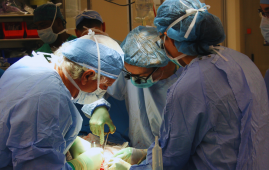

As demand for SARS-CoV-2 coronavirus testing increases, leaders of the College of American Pathologists meet online to brainstorm possible solutions to the crisis In September, the College of American Pathologists (CAP) began its series of “virtual media briefings” given by leading pathologists and physicians at the forefront of COVID-19 testing which is designed to “offer insights and straight talk” on the crisis confronting today’s clinical laboratories.
During the third virtual meeting on December 9, presenters discussed how the ever-increasing demand for COVID-19 testing has placed an enormous amount of stress on clinical laboratories, medical technologists (MTs), and clinical laboratory scientists (CLSs) responsible for processing the high volume of SARS-CoV-2 tests, and on the supply chains medical laboratories depend on to receive and maintain adequate supplies of testing materials.
The CAP virtual meetings, collectively titled, “The Rapidly Changing COVID-19 Testing Landscape: Where We Are/Where We Are Going,” are available for viewing on YouTube and Facebook.
Critical Supply Chain Deficiencies Hamstring Nation’s Clinical Laboratories
“As soon as we get one set of supplies, then it’s another set of supplies that we can’t get our hands-on,” said Christine Wojewoda, MD, Clinical Pathologist and Associate Professor at the University of Vermont Medical Center, during the third CAP virtual briefing. “Right now, we’re very concerned that our lab can’t get pipette tips that have a certain filter in them to transfer patient samples into the tubes that we need, or the plates that we need to do the testing. If we can’t get the patient sample into where it needs to go, safely, without contaminating other patient samples, that’s a big issue.”
Other members of the CAP panel concurred with Wojewoda and indicated that their clinical labs also are encountering supply chain challenges.
“It’s a daily battle,” said Amy Karger, MD, Ph.D., Clinical Pathologist and Associate Professor at University of Minnesota Physicians. “One of our managers spends hours a day making sure our lab has enough supplies, plastics, and chemicals to do the testing that we want to do. And he is often having to look for alternative solutions for COVID-19 testing, making phone calls, trying to find alternative products, and so we have a consistent worry about that.”
A June survey of CAP-accredited laboratories for COVID-19 testing found that more than 60% of lab directors reported difficulties in procuring critical supplies needed to conduct COVID-19 testing. The respondents indicated they encountered substantial barriers to obtaining equipment needed for SARS-CoV-2 testing—particularly test kits (69%), swabs (66%), and transport media (62%).
Staff Burnout and Shortages at Many Medical Laboratories
Karger also indicated that she is concerned about staff burnout and the toll the workload is taking on medical technologists at her laboratory.
“Lab staff have been working full throttle since March. I think that is often lost on people. They kind of assumed that when cases were low with COVID-19, that maybe the lab staff got a break. Well, that wasn’t the case,” she stated, adding, “They [the medical technologists] were planning for this surge that we’re experiencing now and have been working often seven days a week, double shifts to get us to this point of high testing capacity [to respond to the demand for COVID-19 testing].”
Another member of the CAP panel echoed Karger’s concerns.
“We worry about that as well,” said Patrick Godbey, MD, Founder and Laboratory Director at Southeastern Pathology Associates and current CAP President. “This demand for COVID-19 testing has made an already bad situation worse because there’s an absolute shortage of medical laboratory personnel and the increased demands on clinical labs have made this shortage even more acute.”
Almost all of the surveyed CAP-accredited laboratories reported losses in revenue and financial stress since the pandemic started. But few had applied for any of the available funds offered through federal assistance programs. The survey found that the top issues among pathologists reported by laboratory directors were:
- reduced work hours (72%),
- reductions in pay (41%),
- increased burnout (21%), and
- increased work hours (20%).
According to the survey, the top stresses affecting non-pathologist professionals working in clinical labs were:
- reduced work hours (69%),
- reduced staff capacity (36%),
- temporary furloughs (34%), and
- increased burnout (31%).
‘An Overwhelming Sense of Doom’
Of course, clinical laboratory managers have been dealing with the dwindling availability of qualified personnel for years, as one medical technologist training program after another closed and the supply of MTs and CLSs tightened. Dark Daily’s sister publication The Dark Report covered this trend as far back as 2012. (See, “GHSU Graduates Med Techs Using Distance Training: Medical Laboratory Scientist training program helps laboratories to recruit and to train MLSs.)
The diminishing labor pool trained for COVID-19 testing—coupled with high stress/burnout among existing staff—is a major impediment to ongoing expansion in the daily number of molecular COVID-19 tests that can be performed by the nation’s labs.
Also, the already-tight supply of med techs means many metropolitan area labs—particularly hospital labs—are operating with just 75% of the number of staff they are authorized to hire because there are no techs available. Thus, existing staff are working lots of overtime, and vacant FTE positions are being temporarily filled by MTs placed by employment agencies.
A New York Times (NYT) article in December, titled, “‘Nobody Sees Us’: Testing-Lab Workers Strain Under Demand,” revealed that testing teams across the country are dealing with “burnout, repetitive-stress injuries, and an overwhelming sense of doom.” The article reported on the shortages of supplies needed to perform testing and states there is a “dearth of human power” in the field of pathology as well.
The supply of MTs and CLSs, molecular PhDs, clinical pathologists, MLTs, and other laboratory scientists available to work in the nation’s labs is finite and training programs take years to produce qualified workers to perform laboratory testing.
In the third CAP virtual media briefing, the panel suggested that medical laboratory workers should be among the first to receive the COVID-19 vaccine.
“They are encountering and handling thousands of samples that have the active live virus in them,” Karger said. “We are getting 10,000 samples a day [for SARS-CoV-2 testing]. That’s a lot of handling of infectious specimens and we do want them to be prioritized for vaccination.”
She added, “From an operational standpoint, we need to keep our lab up and running. We don’t want to have staff out such that we would have to decrease our SARS-CoV-2 testing capacity, which would have widespread impact on our health system and our state.”
Since the pandemic began nearly a year ago, there have been more than 18 million cases of COVID-19 confirmed in the US and more than 300,000 people have died from the virus, according to data from the federal Centers for Disease Control and Prevention (CDC).
And, as we move into flu season, the number of new COVID-19 cases is reportedly increasing, which adds more stress to clinical laboratories and their supply chains. As this is unlikely to end anytime soon, clinical lab managers must find new ways to do more with less.
more recommended stories
 Texas Medical Board Releases Abortion Training for Physicians
Texas Medical Board Releases Abortion Training for PhysiciansKey Takeaways Texas Medical Board has.
 Safer Allogeneic Stem Cell Transplants with Treg Therapy
Safer Allogeneic Stem Cell Transplants with Treg TherapyA new preclinical study from the.
 Autoimmune Disorders: ADA2 as a Therapeutic Target
Autoimmune Disorders: ADA2 as a Therapeutic TargetAdenosine deaminase 2 (ADA2) has emerged.
 Kaempferol: A Breakthrough in Allergy Management
Kaempferol: A Breakthrough in Allergy ManagementKaempferol, a dietary flavonoid found in.
 Early Milk Cereal Drinks May Spur Infant Weight Gain
Early Milk Cereal Drinks May Spur Infant Weight GainNew research published in Acta Paediatrica.
 TaVNS: A Breakthrough for Chronic Insomnia Treatment
TaVNS: A Breakthrough for Chronic Insomnia TreatmentA recent study conducted by the.
 First-of-Its-Kind Gene-Edited Pig Kidney: Towana’s New Life
First-of-Its-Kind Gene-Edited Pig Kidney: Towana’s New LifeSurgeons at NYU Langone Health have.
 Just-in-Time Training Improves Success & Patient Safety
Just-in-Time Training Improves Success & Patient SafetyA study published in The BMJ.
 ChatGPT Excels in Medical Summaries, Lacks Field-Specific Relevance
ChatGPT Excels in Medical Summaries, Lacks Field-Specific RelevanceIn a recent study published in.
 Study finds automated decision minimizes high-risk medicine combinations in ICU patients
Study finds automated decision minimizes high-risk medicine combinations in ICU patientsA multicenter study coordinated by Amsterdam.

Leave a Comment